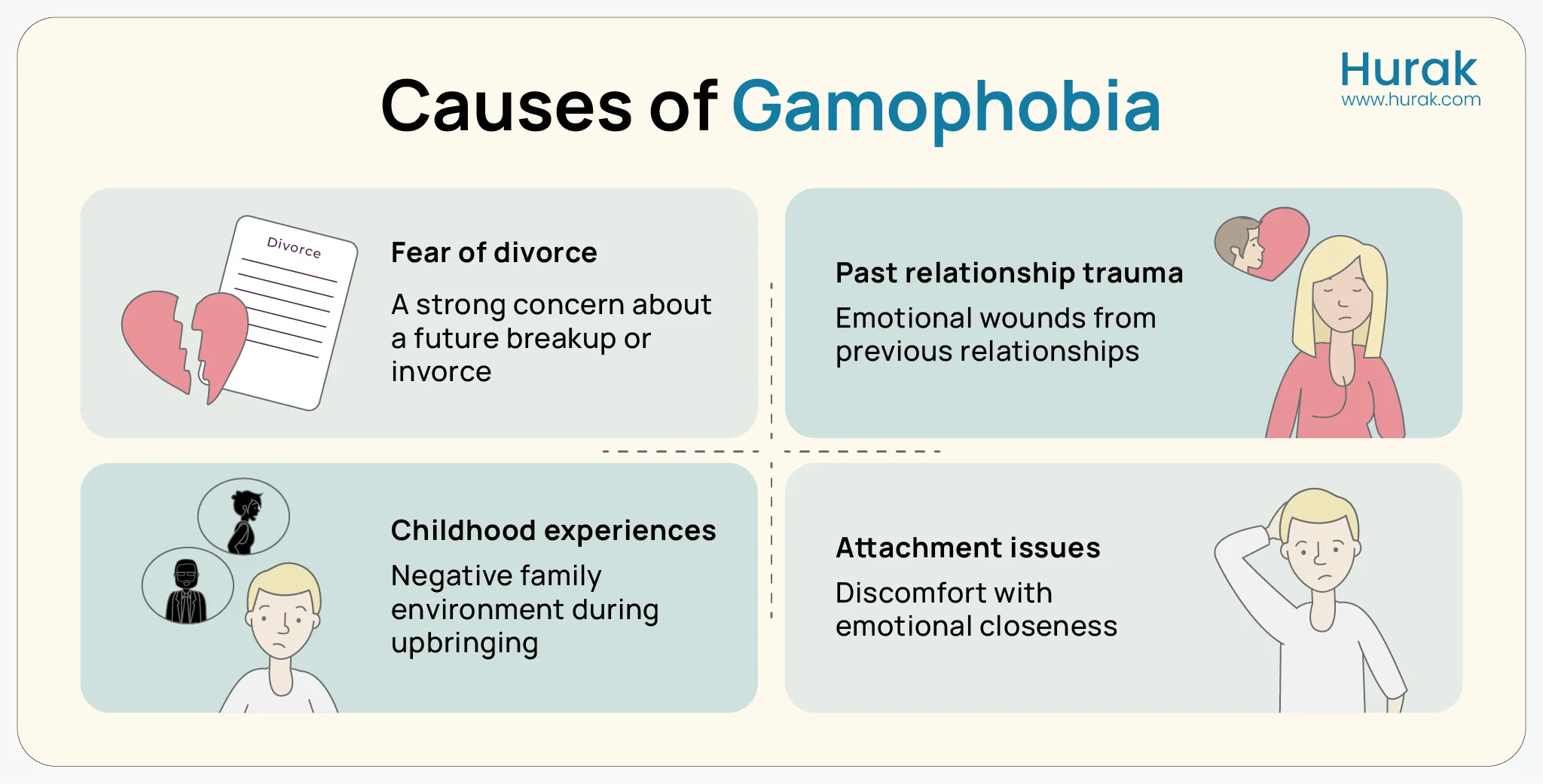Gamophobia, the fear of commitment or marriage, can be a painful and isolating experience. For many, it’s rooted in past heartbreak, trauma, or toxic relationships. In this article, we’ll take a closer look at what causes gamophobia, the symptoms it can trigger, and how it can be treated.

What is Gamophobia?
Gamophobia is an intense and often irrational fear of commitment, particularly in romantic relationships. People with this fear may feel anxious or overwhelmed at the idea of long-term relationships or marriage. As a result, they may avoid serious connections altogether, which can negatively affect their personal lives.
Symptoms of Gamophobia
The symptoms of gamophobia can vary, but they typically include:
Symptoms | Examples |
Intense anxiety | A strong sense of dread or panic when thinking about or discussing commitment. |
Avoidance behaviour | Actively avoiding relationships that may lead to commitment or a serious partnership |
Physical symptoms | Sweating, rapid heartbeat, or nausea when faced with commitment-related conversations or situations. |
Negative thoughts | Constantly worrying or thinking negatively about marriage, long-term relationships, or future commitment. |
Understanding the Root Causes of Gamophobia
Witnessing Parental Divorce
Observing the breakdown of parental relationships, such as divorce, can leave a lasting fear of commitment.
Personal Experience with Toxic Relationships
Individuals who have suffered emotional trauma or betrayal in previous relationships may fear repeating these experiences.
Fear of Repeating Negative Patterns
Growing up in unstable or dysfunctional relationships can lead to a fear of repeating similar patterns in one’s own romantic life.
Low Trust in Others
Past betrayals, such as infidelity or manipulation, may make it difficult for someone to trust others in a long-term relationship.
Societal Pressure
Unrealistic expectations around marriage and commitment can create anxiety, with individuals fearing failure or loss of independence.

Is Gamophobia the Same as Commitment Issues?
While gamophobia specifically refers to the intense fear of marriage or long-term commitment, commitment issues is a broader term. People with commitment issues may struggle with emotional vulnerability, fear of losing independence, or past relationship trauma, but not all experience the irrational fear or anxiety that defines gamophobia. In essence, all gamophobes have commitment issues, but not everyone with commitment issues has gamophobia.
How to Treat Gamophobia
While gamophobia can feel overwhelming, there are effective strategies to overcome it and build healthier relationship patterns.
Cognitive Behavioural Therapy (CBT)
CBT is a proven method for addressing irrational fears. A therapist helps individuals identify negative thought patterns around commitment and replace them with healthier responses.
Open Communication
If you’re in a relationship, having honest conversations about your fears can create mutual understanding. Openness can reduce pressure and help partners navigate commitment together.
Gradual Exposure
Facing commitment-related situations gradually can reduce fear over time. Start with small steps, like discussing future plans or committing to regular meetups, in a relaxed setting.
Practice Self-Reflection
Journaling, mindfulness, or guided introspection can help uncover the personal beliefs and past experiences contributing to your fear of commitment.
Conclusion
Gamophobia, the fear of commitment or marriage, can feel isolating, but it’s more common than you might think. With the right support, whether through therapy, communication, or self-reflection, it is possible to overcome this fear and build healthier, more meaningful relationships.
Frequently Asked Questions
What is the meaning of gamophobia?
Gamophobia is the irrational fear of commitment or marriage, often triggered by past trauma, failed relationships, or emotional insecurity.
Is gamophobia the same as commitment issues?
Not exactly. Commitment issues can be mild and situational, whereas gamophobia is a more intense, often anxiety-inducing fear of long-term relationships or marriage.
What are the common signs of gamophobia?
Typical signs include intense anxiety when thinking about commitment, avoiding serious relationships, negative thoughts about marriage, and physical symptoms like nausea or sweating.
Can gamophobia be treated?
Yes. Gamophobia is treatable through methods like cognitive-behavioural therapy (CBT), gradual exposure, open communication, and self-reflection.
What causes gamophobia?
It can stem from witnessing parental divorce, toxic past relationships, fear of repeating negative patterns, trust issues, or societal pressures around marriage.
Explore Our Popular First Aid and Mental Health Training Courses
Looking to broaden your first aid knowledge? Here are more expert-led courses we offer at Hurak:
- First Aid at Work: A comprehensive 3-day course equipping employees with essential first aid skills for high-risk workplaces.
- Emergency First Aid at Work: A 1-day practical course covering life-saving techniques for low-risk work environments.
- Online First Aid At Work Course: A flexible, CPD-accredited course to build first aid knowledge at your own pace, ideal for general awareness.
- Mental Health First Aid: Learn to recognise, respond to, and support mental health issues in the workplace with this certified training.
Looking for more information on Mental Health First Aid? Visit our Mental Health First Aid courses to explore available training options.





